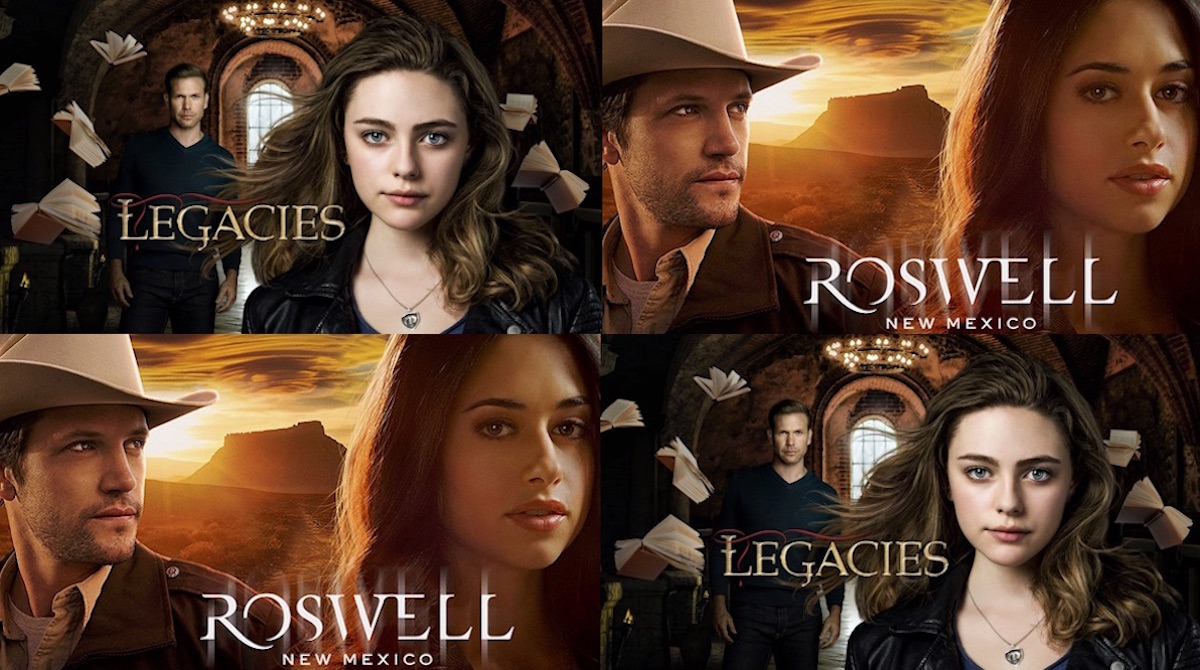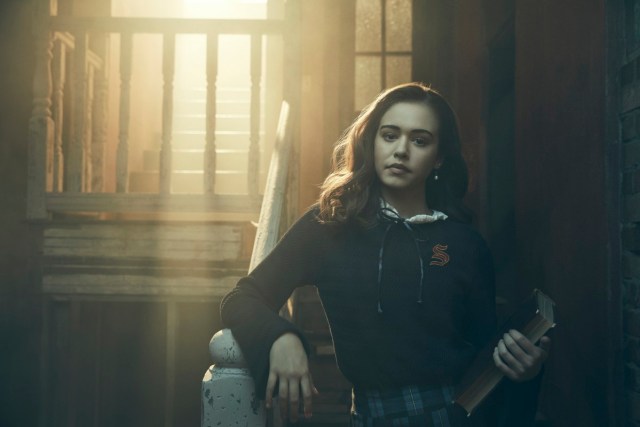Two of The CW’s New Shows Are Casually, Gloriously Queer
Good things that we saw at NYCC.


***Some spoilers for the first episodes of Legacies and Roswell, New Mexico***
We talk a lot about queer representation around these parts, especially the glaring lack of it in big-budget tent-pole Hollywood films. Television has been better—for years—about telling queer stories, but it took us a while to arrive at a place where a character’s sexuality is no big deal. At NYCC, I watched two pilots that had me teary-eyed at just how easily the queer characters were included.
When I was growing up, the narrative around queer characters—especially on shows aimed at teenagers—was all about a big “coming out” moment, usually fraught with anxiety and angst, the acceptance or shunning from family members and friends, and an ongoing tortured struggle to come to peace with one’s identity.
Rarely were they allowed to just be “normal” teenagers or young adults; they had to be conspicuously queer, representative of society’s own social issues with the subject matter. And this was after the time period when gay characters seemed to exist primarily to tell a cautionary Very Special Episode story about AIDS and then vanish.
Times have thankfully changed, and in two pilots created for a youthful demographic that I saw at New York Comic Con, The CW’s Vampire Diaries/Originals spin-off Legacies, and the Roswell reboot Roswell, New Mexico, characters were here and queer and it was never remarked upon as anything but normal and expected and not a big deal. I clapped a lot.
I’ll have more extensive reviews of the pilots—both of which I unexpectedly adored—later this week, but I think the inclusion of main-cast queer characters on two high-profile new shows deserves space all on its own.
On the supernatural high school drama Legacies, one of headmaster Alaric Saltzman’s twin daughters, Josie (the bright-eyed Kaylee Bryant), is introduced off the bat as bisexual (or perhaps pansexual), as she and her sister Lizzie show the new werewolf in town around the Salvatore School for the Gifted. Another young witch, Penelope, is casually mentioned as Josie’s “evil” ex and no one bats an eyelash. Later, Josie appears to be interested in a male character and is also still emotional about her history with Penelope—just average high school girl things.

“Binary assumptions about sexuality are dated,” says a character on Legacies, in the kind of pithy one-liner penned for a new modern audience hungry to hear it. I couldn’t stop thinking about how much it would mean to a young person tuning into Legacies for the first time and having this be one of the messages in the show’s premiere. It certainly meant a lot to this older person.
Josie is also as far from being an outsider as possible: she’s a legacy herself, the daughter of one of The Vampire Diaries‘ popular characters, and her father serves as the show’s authority figure. In the pilot, we see Alaric as a loving father, and while we haven’t heard his opinion on his daughters’ romantic adventures, it’s impossible for me to imagine the Alaric we came to know via eight seasons of TVD as anything but supportive so long as they are safe. The wizarding Harry Potter world—which the show knowingly winks at often—should take note that non-binary assumptions about sexuality are what the kids want and are more than capable of seeing play out onscreen.
I went into the screening of Roswell, New Mexico with trepidation and emerged an enthusiastic fan. The original WB/UPN drama, which ran from 1999-2002 and was set in high school with a sort of Romeo-and-Juliet-and-aliens dynamic, has a high nostalgia factor for many fans but wasn’t exactly screaming out to me for a reboot. It turns out, however, that this is a new Roswell for a new generation. The pilot thumbs its nose so many times at the Trump era that I would support it running for political office.
Roswell, New Mexico is fantastically diverse, turning Liz Parker back into the Liz Ortecho that Melinda Metz’s Roswell High books created. Biomedical researcher Liz (the vibrant Jeanine Mason) is the daughter of undocumented immigrants, and she’s back in her small, claustrophobic hometown where she quickly has to face the tragedies she left behind and also the existence of aliens. Said primary alien is Max (an excellently brooding, stubbled Nathan Parsons), who was long in love with her. The new show sidesteps the old (while still tipping the nostalgia hat with several Roswell Easter eggs) by setting the characters ten years after high school and opening up a world of adult possibilities.
The pilot gets in several digs at the Trump administration’s harsh immigration policies and provides blistering commentary on American racism within the first ten minutes. That’s when I sat up and really started paying attention. This is the Roswell that 2018 deserves.
For all of Max and Liz’s starry-eyed staring and the will they/won’t they narrative that will likely shape the show, the only kiss featured on the pilot is between two queer men. It’s an explosive, passionate embrace, well-earned via the tension they evince throughout the episode, and it had the entire panel audience at NYCC cheering and applauding. It was an incredible moment to share with so many people and to feel their enthusiasm alongside my own.
While it’s likely that this relationship is going to see its fair share of angst and bumps in the road, you get the sense that the drama will result from the characters’ divided loyalties and personality clashes, not because of their sexuality. I’d like to think that in 2018, these grown men won’t agonize about being together because they are gay, but rather because there are aliens and there are alien hunters vying for space in Roswell.
We’ve entered into a new television era where sexuality is important but not all-encompassing of a character’s presentation and development. On Legacies and Roswell, New Mexico, being queer appears to be a character note rather than their defining element. These characterizations shouldn’t feel so refreshing and revolutionary—they should be the norm. But the pilots made me think that we’re at least moving forward to a place in time where this will become standard and not feel so exceptionally exceptional.
In the past, supernatural creatures like witches, vampires, werewolves, and aliens were often queer-coded, their otherworldly “otherness” a stand-in for sexual identities that were never named or else treated as threatening. On these new shows, there is no need for coding: the queerness is there and embraced, and the threats to society are located elsewhere—in the Oval Office, say.
Legacies debuts on The CW on October 25th; Roswell, New Mexico will have a midseason CW premiere.
(images: The CW)
Want more stories like this? Become a subscriber and support the site!
—The Mary Sue has a strict comment policy that forbids, but is not limited to, personal insults toward anyone, hate speech, and trolling.—
Have a tip we should know? [email protected]
